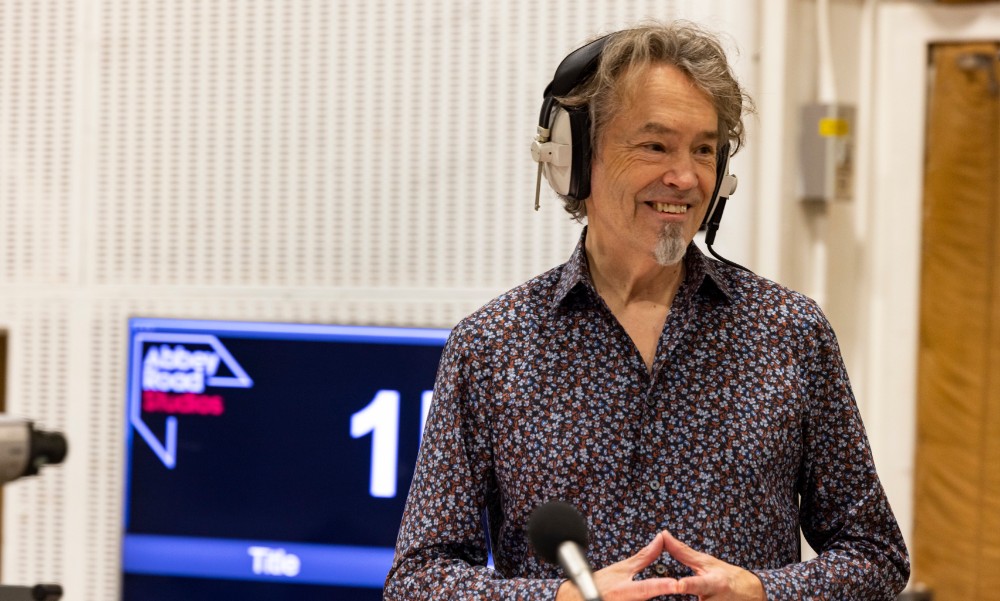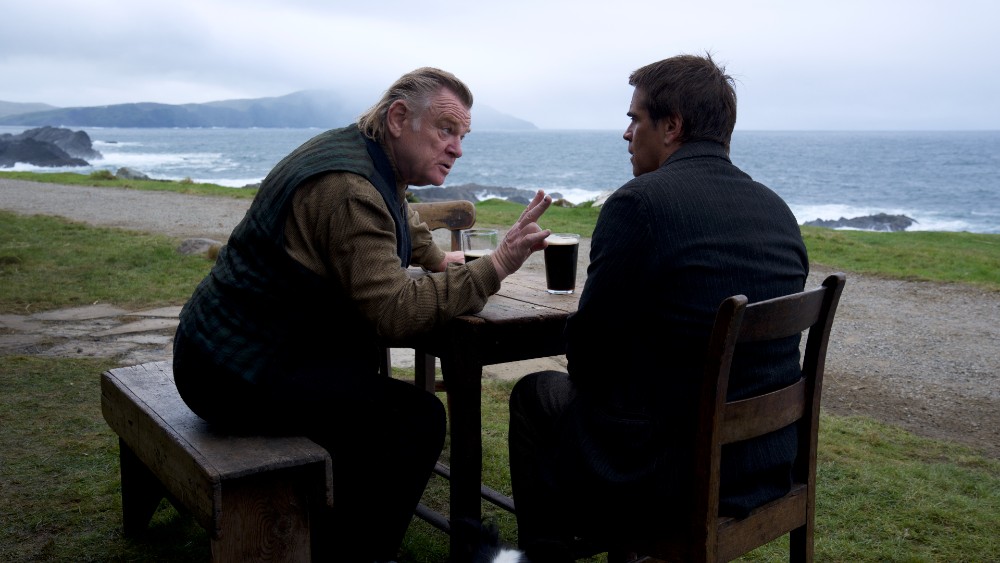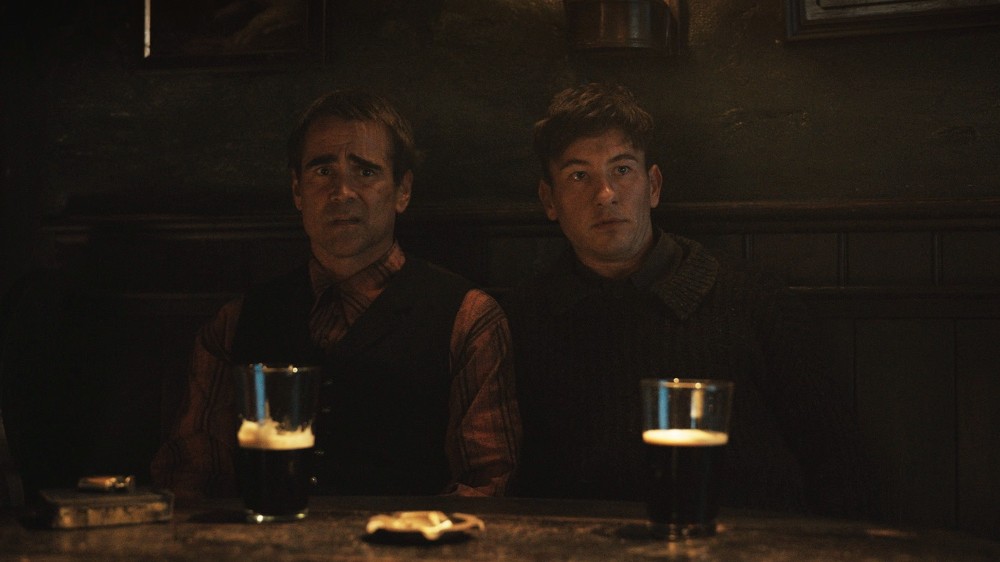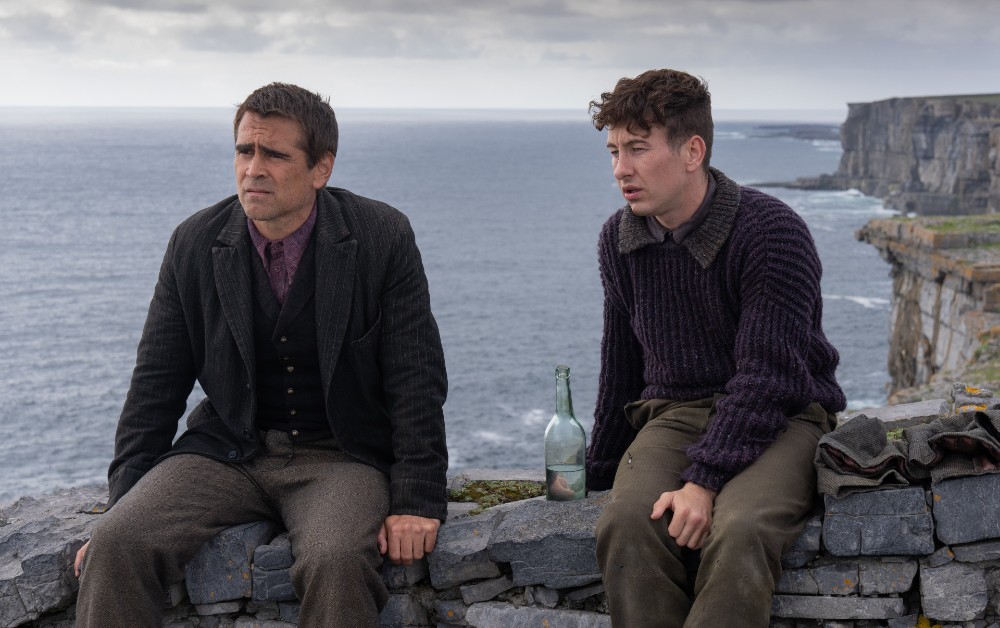Composer Carter Burwell has done a fine job establishing and maintaining relationships with a number of talented filmmakers, as evidenced by the fact that they keep coming back to him to provide music to their films.
One of Burwell’s frequent collaborators is Writer-Director Martin McDonagh, who has worked with the composer going back to his first feature film, In Bruges. Their latest effort, The Banshees of Inisherin, reunites the cast of that film, as Colin Farrell plays Pádraic, a man living on an Irish island in the early 1920s, who one day discovers that his best friend Colm, played by Brendan Gleeson, no longer wants to be friends. Pádraic is understandably upset, but he keeps pushing Colm for an explanation — was it something he said or did? — and things just get darker from there.
As with McDonagh’s previous work, Banshees has a very specific tone that straddles the line between comedy and drama, and much of that balance lies in Burwell’s score, which is fairly minimal compared to his other work but does a fine job filling in the spaces between McDonagh’s rich dialogue.
Below the Line has spoken with Burwell quite a few times over the past 20 years, most recently for Joel Coen‘s The Tragedy of Macbeth, and he recently jumped on Zoom to discuss his latest movie, which has him in the thick of the awards race.

Below the Line: Banshees is your fourth movie with Martin McDonagh, and when I spoke to him a few months back, he said he didn’t want traditional Irish music, so what were some of your earlier discussions on Banshees about?
Carter Burwell: He sent me the script before he shot, which he has typically done, but in this case, there’s actually a practical reason that he wanted to talk about it before he shot, which was that Brendan Gleason’s character is a composer — he’s writing a fiddle tune. Martin wanted to figure out whether I was going to write that tune. The reason it came up was [that] Brendan also wanted a chance to write it. He is, in fact, a fiddler. Martin had assumed I would write it but Brendan was like, ‘Why doesn’t Carter try it, and I’ll try it, and may the best tune win?’
I really didn’t see any [point] in getting into a competition with Brendan. If he can write something that we like, that seems, obviously, to be the best choice. So, Martin and I waited, and Brendan sent us some of his ideas, and we were happy with those. That was the very first conversation we had, well before shooting, so that all had to be figured out before the shoot. Along the way, we talked a little bit about the score, too, because for instance, if I ended up writing the fiddle tune, would that affect the score, and would you pick that [theme] up in the score, even if Brendan wrote it?
There were a lot of these types of things that were worth discussing before the shoot. One of the things that came up was, I said, ‘It’s about two Irishmen off the coast of Ireland during the Irish Civil War. Why wouldn’t the score be Irish in some way?’ That’s when Martin said that he really didn’t want to do that. He didn’t know what he did want to do, but he knew he didn’t want to do that. That’s really as far as that got until after he shot the film. I was thinking about other approaches, but frankly, until I saw the film, I really didn’t know what to do.
BTL: The music in Banshees seems rather minimal. Obviously, the dialogue is important in anything Martin makes, and the music leaves a lot of room for that, so was that very intentional so as to keep the focus on the characters?
Burwell: Well, I think that’s true. My personal taste is to not be writing music against dialogue, although, of course, a lot of films have wall-to-wall music, honestly, but my taste is for the viewer to be able to concentrate on what’s going into your ears at any one moment, and too many things happening at the same time, I think, can be a little distracting. So anyway, that’s my taste, so it does mean that I prefer to be writing between the dialogue. Sometimes, I guess even in this film, there might be some music under dialogue, but it’s very rare.
So, yes, the way that Martin writes, and this is often true — for instance, the Coen Brothers [do it], too — the dialogue is like its own melody. It’s got its own poetry to it. For all these reasons, the music is largely happening when people are not speaking. Even when it’s happening when people are not speaking, I think you could still refer to it as minimal. It’s definitely quiet in the same way that no one in the film hardly ever raises their voice, even though it’s a very heated story. Intense things are going on, but there’s not much yelling. People don’t run back and forth; they walk from place to place. The music is kind of like that. It’s maintaining that sort of identity, along with the characters.
BTL: The instrumentation seems to be simpler as well, like a bell and a harp. There rarely seem to be more than two or three instruments played at a time.
Burwell: There are more, but basically, in terms of what you as a listener would identify, like the melody and the counter melody, you’re absolutely right. It’s a celeste, harp, flute, and then down below that, there’s percussion and gamelan, these metallic instruments, and sometimes strings or bass clarinet. But if you look at it on the page when I was taking the music to go record, it looks really simple… that’s true. [chuckles]

BTL: I mean, compared to an orchestral thing where you have 80 parts and pages upon pages of music.
Burwell: As a composer, I like writing. “Can I do something else here, like a counter melody or more harmony or something?” But simple was always right. It’s partly about the characters, I think. Mostly, the music was written from the point of view of Colin Farrell’s character, and he’s a simple guy. That’s the very definition of his character, really. You kind of get the impression everything has always gone very smoothly for him until exactly the moment that the movie begins, and things started going badly. Harmonically, it’s a little more complicated, but I’d have to start talking composer language if we’re going to get into that. I wanted it to sound simple. I wanted it to sound, honestly, like a fairy tale, almost.
BTL: It’s very theme-driven, so is that something you do naturally or something Martin wanted? It definitely seems like there were a number of recurring themes.
Burwell: I think there are three main themes that recur throughout it. We didn’t really talk about it. Mostly, it all has to do with Pádraic, Colin Farrell’s character. I don’t think I ever really play Brendan’s character in score. Even when the music talks about Siobhan, Pádraic’s sister, who’s an important character, it’s still always from his point of view. It very strongly suggests that character, and the persistence of that theme, I think, is it serves one very particular purpose. At the beginning, it’s a very, as you said, simple theme, and it’s got a certain innocence to it, as this guy is walking to the pub, hoping to see his friend the first time you hear it. When that same theme plays, like, an hour and a half later, at that point, it’s playing the lost innocence by maintaining that melody [and] making sure that the audience can remember it. It developed from sincerely playing his character at the beginning to then ironically playing that character’s innocence, which has now been lost at the end. These are not things we really talked about. It just seemed to serve a purpose for me.
BTL: This is not a horror movie or even a thriller, but it certainly has elements of that in the music. When you listen to the music by itself — and I’m not sure if that’s in my own head from having seen the movie a few times — it feels like it gets darker as it goes along.
Burwell: That’s definitely true. What’s interesting is that I’ve noticed [in] talking to people recently that some people talk about it like it was a comedy and they thought it was hilarious. And then some people think it’s a horror film. Some people are really disturbed by it, and some people are moved by it. It’s interesting that it can be interpreted in so many different ways. Some part of that has to do with how emotionally you react to [it]. It’s a very sad story. And of course, it’s also, viscerally, a little horrific. But at the same time, if you just listen to the language, then you are bound to start laughing because of the writing, too.
BTL: I don’t normally think of Martin as a genre filmmaker, but I realize as we’re talking that there are elements of genre in all his movies. Obviously, Seven Psychopaths more than others, but also Three Billboards, which is a crime thriller, in some ways.
Burwell: I agree with you. He’s not a genre filmmaker the same way, for instance, the Coens are typically interested in genre, but the structure sometimes and the style [do] seem to exist within some genre. I don’t know what you would call this one, exactly. This is so pared down, I can’t think of what genre you would even call it.
BTL: When you come up with a theme, what drives it? And do you typically come up with themes while reading a script, or do you wait until a director has something to show you?
Burwell: While [Martin] was shooting, and while I had been told that we were not going to have an Irish score, I was playing around on the piano and thinking of different things. I had a variety of possible directions, just waiting on paper until I saw the film. But it’s one of those films where the script didn’t really tell me that much about what the music should be. For instance, the script wouldn’t tell you how very beautiful the film is. You read the script, you might come away thinking, “Oh, my God, the fingers!” But in fact, you never really see the fingers being cut off. You see one finger once, maybe, and as gruesome as that is, it’s actually not visually a big part of the movie, but you do get the sense of the beauty and the role of nature on that island — shots of birds and goats and things like that. So really, I waited. Seeing the film told me a lot, also, about all the space between the dialogue, all the time spent walking from one place to another and things like that. Even though I had some ideas written down while they were shooting, it wasn’t until I really saw the film that I could start to know what works and what doesn’t.

BTL: I remember when I saw the movie, that beautiful music over the first shot of the island really drew me in, so I knew it was going to be something special even before meeting the characters.
Burwell: Martin really wanted to do a film to capture the beauty of Ireland and of those islands. That was definitely one of his goals, and he did. Of course, that helps frame the awfulness, in an interesting way, because these people spend all their lives in this beautiful spot, but it doesn’t change the fact [that] they’re human and [they] face all the same issues that humans do everywhere.
BTL: Was the entire score created by real musicians playing real instruments or does it feature a mix of sources?
Burwell: The gamelan is samples. Those instruments, I’ve used real ones, but they’re very hard to control. They don’t follow Western scales, so to make them work with the other instruments, I have samples of them and I can tune them into a Western scale, so they’re just a little more usable with Western instruments. The gamelan, [and] indeed, I think all the percussion is sampled, just because it gives me a lot more control of it. The celeste I played, and the harp and flutes and strings are all live players and harp. [The] harp is very much a featured instrument; I’m very dependent on the player for that.
BTL: Do you have stuff you have recorded at your home studio that you bring into another recording studio where you record the live players?
Burwell: Exactly, that’s right. I work out at the end of Long Island so I’m not near any of the studios. In this case, we recorded at Abbey Road in London, all the rest of it, but I brought my tracks from my home. With computers and the internet, all that stuff is so seamless nowadays. You would have no idea where the tracks were recorded. During the pandemic, everybody was recording in their bathroom.
BTL: It must be nice to get away from that and get back into a studio like Abbey Road.
Burwell: The week we were at Abbey Road, they said that week, they had abandoned all the pandemic protocols. A week before, the woodwinds would have had to be behind a Plexiglas barrier. The string players would have had to all be sitting six feet apart. The week I was there, I don’t know if it was the musicians’ union or the studio, or who was in charge of these things, but they got rid of it, and everybody was so happy and so relaxed to be sitting next to each other. I can’t say whether it’s the best thing for their health or not, but for our mental health, we were certainly very pleased to be working like normal.
BTL: I assume you weren’t on set and working with Brendan on all his fiddling scenes, right?
Burwell: They were shooting well, during the pandemic, and going would have involved 10 days of isolation on the mainland before you’re even allowed to go to the island. I’ve got kids in school, so it just didn’t fit my current lifestyle to do that. But I would love to. I want to get over there sometime. I’ve been to Ireland a couple of times, but I’ve never been to those islands.

BTL: Did I hear some vocals in the score as well, or was that some of the more traditional stuff he ended up using?
Burwell: Those were pre-existing recordings. There are these two pieces of [Johannes] Brahms leader that are in there when things get absolutely the worst for Pádraic, like after his donkey dies. There’s leader being played while he’s buying the donkey, and then at the very end credits, it plays again. At the very top of the film is a Bulgarian piece that I remember well from the ’80s There’s this album called Le Mystère des Voix Bulgares, it was a big thing. It was a beautiful song from that, and I even sang it once at a friend’s wedding back then. It’s very, very popular, certainly amongst people who are into certain types of vocal music. Martin is younger than me, so I don’t think he knew it from that period. He had come across [it] and he said, ‘That’s a beautiful song. I want to use this.’ I said, ‘Don’t you think it’s going to be confusing to people, who will think they’re in Bulgaria?’ I think everybody assumes they’re singing in Gaelic or something.
BTL: Do you ever perform any of your scores live or anything like that, be it one specific movie or a selection of tracks from scores you’ve composed?
Burwell: I’ve done some of that. For instance, Todd Haynes [made] this film Wonderstruck, which was maybe six years ago. It really had wall-to-wall score, because half the movie is actually silent, and the score is playing all through it. We did a live performance of it in L.A. in an old silent movie theater with the orchestra, and I was conducting. That was pretty interesting, it was just [also] terribly nerve-wracking because you think, ‘what am I going to do if we get off by a bar?’ But it all went great, it was wonderful.
Other than that, I have done a couple of gigs where I reinterpret the scores in some way that I think would make for an interesting live performance. But it’s not something I’m particularly interested in. I like writing new music, so revisiting old pieces is honestly not that interesting to me.
BTL: It’s great talking to you again about the lovely score for this film. I look forward to seeing and hearing what you do next. Do you have something else coming out soon?
Burwell: I just finished a film with Brian Helgeland called Finestkind, but I don’t know the release plan at all. Obviously, it’ll be this year. I think they’re thinking spring or summer but I honestly don’t know. And then, Ethan Coen shot a film last fall. I haven’t seen that yet, but I’m going to see it soon, sometime in January, and start working on that.
BTL: You’re now going to get twice as much work with Ethan and Joel making their own movies.
Burwell: I hadn’t thought about it that way! [laughs]
The Banshees of Inisherin is now streaming on HBO Max, and available to buy or rent on all major digital/VOD platforms.





